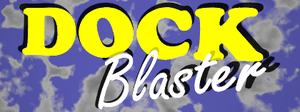DOCK Blaster: Difference between revisions
Jump to navigation
Jump to search
No edit summary |
No edit summary |
||
| Line 1: | Line 1: | ||
[[Image:Dblogo.png|thumb|right|DOCK Blaster]] | |||
DOCK Blaster is a free web based molecular docking and virtual screening service, on the web at [http://blaster.docking.org http://blaster.docking.org]. Alpha testers, please read our | DOCK Blaster is a free web based molecular docking and virtual screening service, on the web at [http://blaster.docking.org http://blaster.docking.org]. Alpha testers, please read our | ||
[[DOCK_Blaster:Alpha_Test | welcome letter]]. | [[DOCK_Blaster:Alpha_Test | welcome letter]]. | ||
Revision as of 03:45, 21 March 2007
DOCK Blaster is a free web based molecular docking and virtual screening service, on the web at http://blaster.docking.org. Alpha testers, please read our welcome letter.
To get started, you will need at the very least the following:
- The structure of the target in PDB format (best) or mol2 format
- A specification of the binding site. This may be one of the following:
- A docked ligand in mol2 format, which is also used to test the docking parameterization
- "hot spots", in PDB format, which may be based on one or more ligands.
- Atoms of residues forming the binding site. The center of intertia of these atoms should coincide with where you expect the ligand to go.
That's really all you need to get started. If you don't have a particular project in mind, and you are just curious about DOCK Blaster, you may use some sample data to experiment. To read more, please consult the topics below.
Before you get started
Preparation and Docking
Understanding the Results
Other information
- DOCK Blaster:Philosophy
- DOCK Blaster:Annotations
- DOCK Blaster:History
- DOCK Blaster:Credits
- Terms And Conditions
- Just Watching
To cite DOCK Blaster, please reference Huang, Shoichet, Irwin, "Benchmarking Sets for Molecular Docking", J Med Chem 2006, 49(23), 6789-6801
We welcome your feedback about DOCK Blaster. Please write to us at comments at docking.org.
